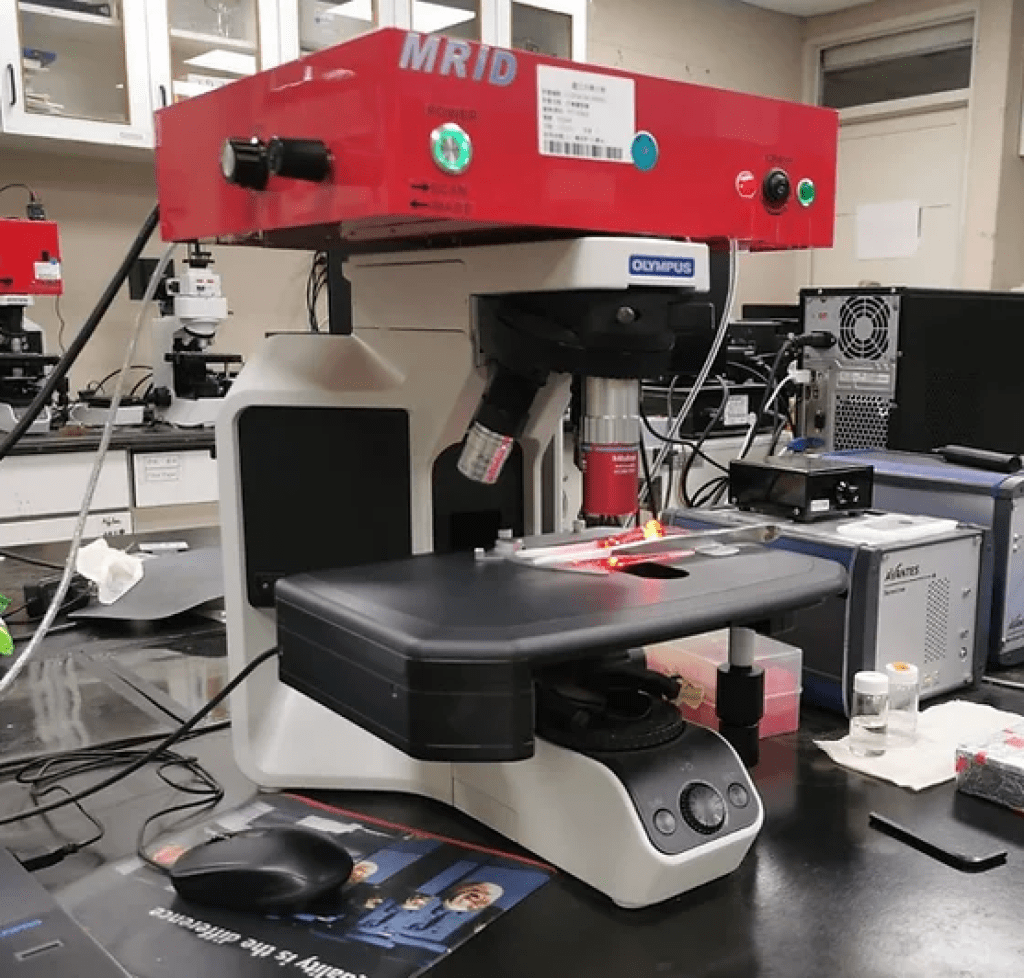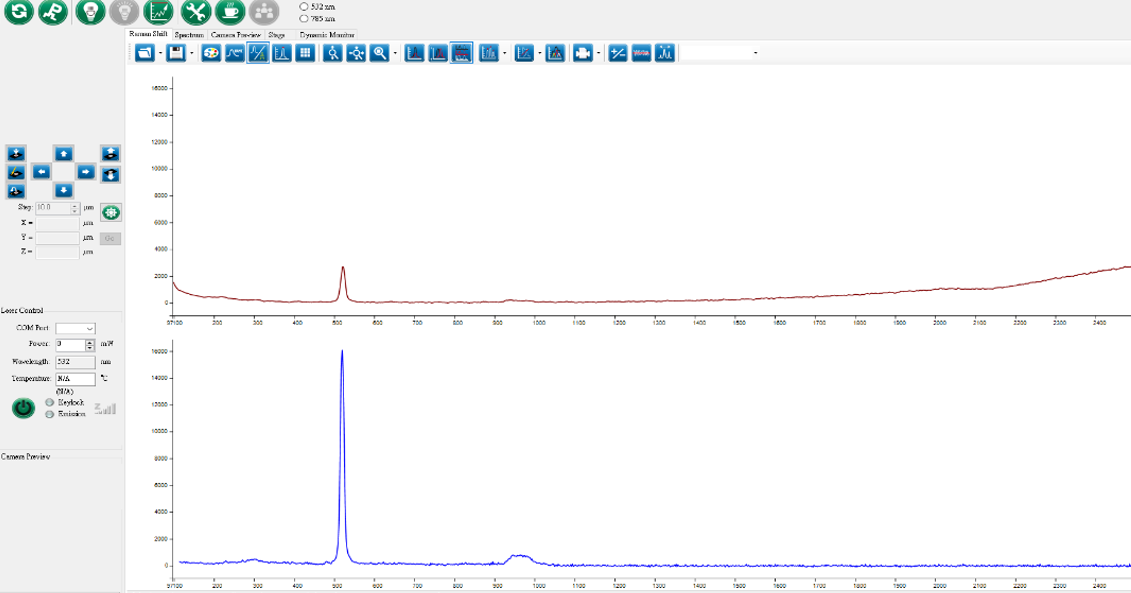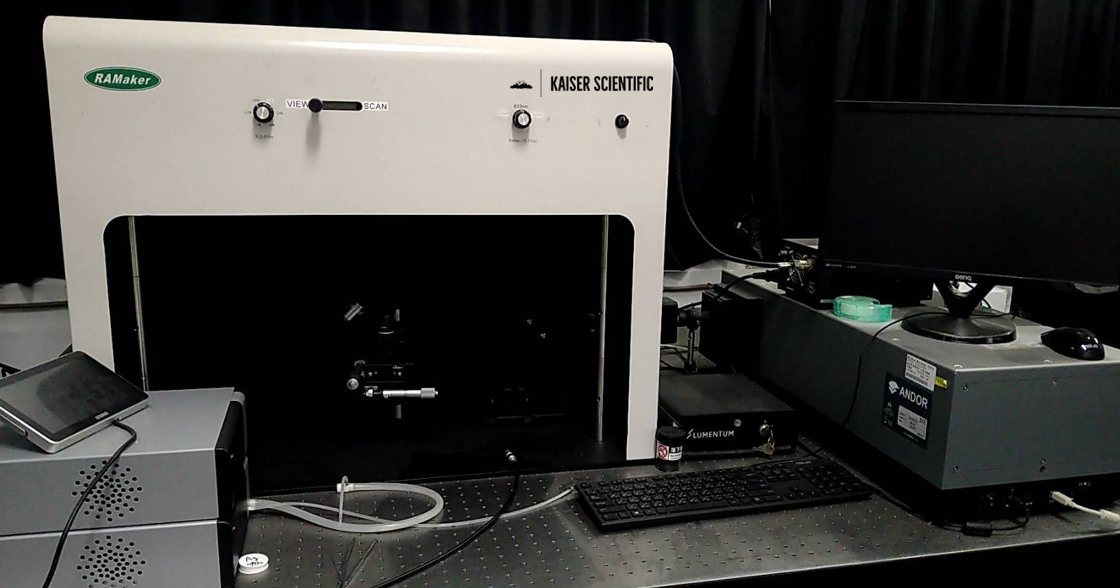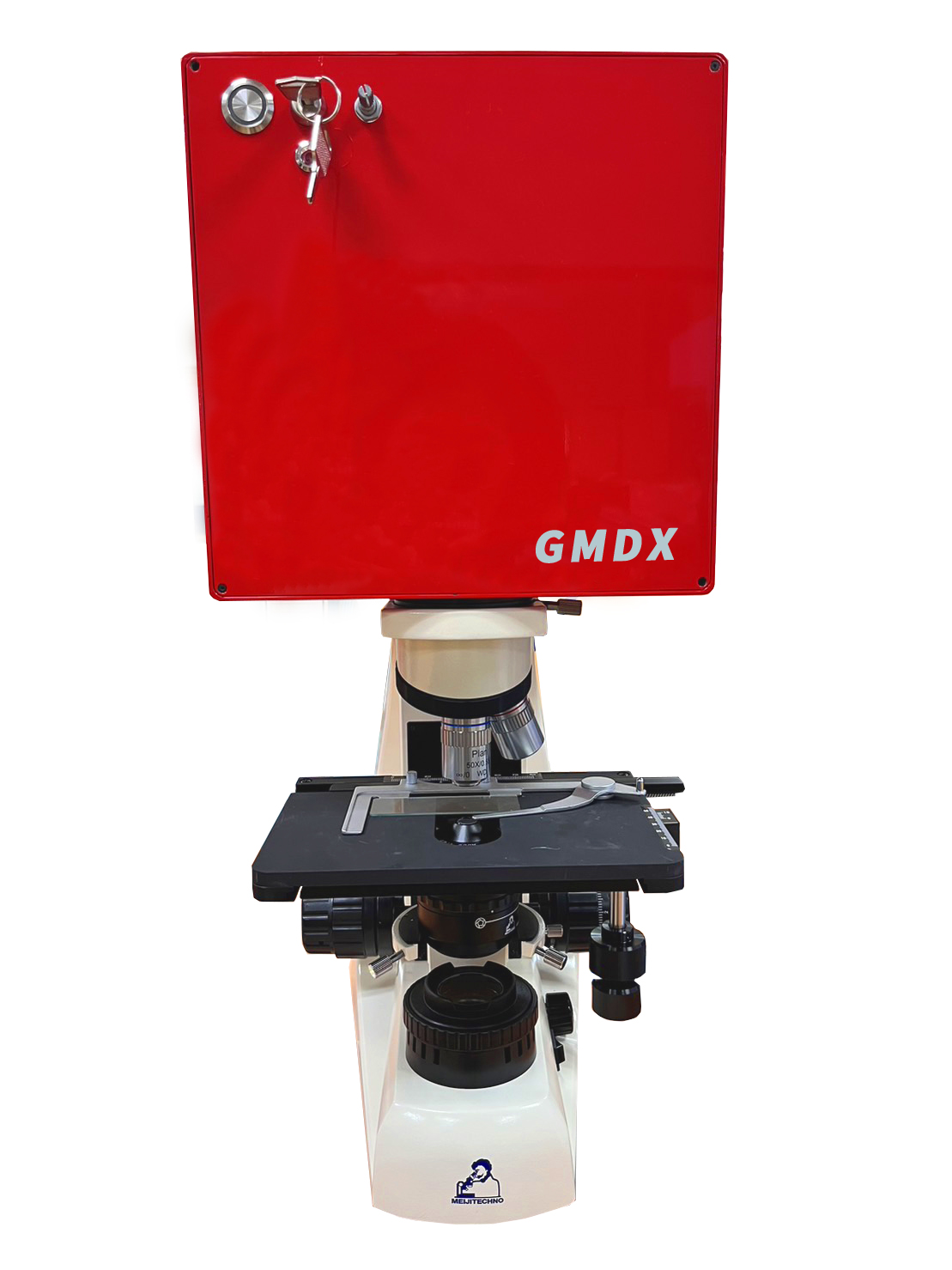The MRID is a micro Raman system featuring two inbuilt lasers that can be automatically switched by its software.

Micro Raman with Dual Laser feature
The MRID presents a groundbreaking Micro Raman system, uniquely featuring dual built-in lasers. Notably, these lasers can be effortlessly switched using advanced software control. Additionally, the system boasts invention patents in Taiwan and the USA, underscoring its novel approach to Raman spectroscopy. Furthermore, the MRID simplifies the traditionally complex process of adjusting optical paths for different laser wavelengths. As a result, it provides a highly dependable and user-friendly optical system that’s easily operated, regardless of the user’s level of optical knowledge.
Designed with a special horizontal interlace, the MRID’s optical pathway is crafted to allow for the inclusion of an additional third laser module or more, thereby significantly broadening its application range. Currently equipped with two permanent lasers and the capability to attach more through optical fibers, the MRID offers extraordinary flexibility. Consequently, users have the freedom to interchange and customize laser options as needed. This versatility paves the way for a wider array of measurement applications, making the MRID an essential tool for various research and analytical endeavors.
Patented Raman with Dual Wavelength Acquisition

The MRID system also offers a unique, proprietary one-click function that lets users automatically record the spectra excited by various wavelengths. This standout feature easily demonstrates how a sample responds differently under diverse laser wavelengths. For example, take the silicon chip: it shows clear differences in behavior at 520 cm^-1 and in the NIR range when stimulated by 785 nm and 532 nm lasers.
| Lasers | 2 (Options: 375, 405, 532, 633, 785, 808 nm) |
| Auto Switch & Laser Power Control | Advanced software control with dual-mode (continual N.D. filter and laser control) |
| Sample Holder | Microscopy Stand with Polarization Features |
| Raman Range | 79~2100 or 3500 or 5500 cm-1 |
| Resolution | 1.3 / 1.8 / 5.4 cm-1 |
| PL Range | 380~1100 nm |
| Dual Wavelength Acquisition | One-click operation to measure different wavelengths. |
| Laser Power Output | Controlled via software with less than 1% error |
| Upgrade Options | Raman Image, Polarization, Temperature Stage, STM Raman, TSCPC/FLIM |
Enhance your research capabilities with the MRID product’s suite of advanced features, designed to meet the diverse needs of scientific exploration and material analysis. Each optional feature is meticulously crafted to provide precision, flexibility, and depth in your investigations:
RPRM (Raman Polarization Rotating Mapping)
Advanced Raman Mapping with XY Motorized Stage
4-Point Probe / Temperature Control
RPRM Module
The RPRM feature is an advanced analytical tool designed to enhance the capabilities of our MRID product by leveraging the principle of Raman Polarization Rotating Mapping. This sophisticated technology addresses the unique challenge presented by anisotropic samples, such as strained films or crystals, whose optical properties can vary significantly with the alignment of their optical axis in relation to the incident laser polarization.
Through the integration of the RPRM feature, users gain the ability to meticulously control and vary the orientation of both the sample and the incident laser polarization. This control is critical for the detailed observation and analysis of anisotropic properties, facilitating a deeper understanding and characterization of the sample’s spectral behavior. By enabling precise manipulation of polarization directions via the MAPM (Mapping and Polarization Management) system, the RPRM feature not only enhances the versatility of the MRID product but also significantly expands its applicational range, providing researchers and professionals with a powerful tool for advanced material analysis.

Advanced Raman Mapping Feature with XY Motorized Stage
The MRID product is equipped with an advanced Raman mapping feature, underscored by its highly precise XY motorized stage, designed to meet the rigorous demands of sophisticated material analysis. This feature offers:


- Versatile Stage Options: Choose from two stage sizes to accommodate a wide range of sample dimensions – 75 x 50 mm or 100 x 100 mm, providing flexibility for various experimental setups.
- Exceptional XY Resolution: Achieve unparalleled detail with a resolution of 0.01 µm (the smallest step size available) in the XY plane, allowing for ultra-fine positioning and mapping accuracy.
- Superior Z-Axis Precision: The system boasts a typical resolution of 0.002 µm in the Z-axis, dependent on the sample’s weight, facilitating precise focus adjustments for optimal imaging and analysis.
This sophisticated Raman mapping capability, combined with its motorized stage, enables users to conduct detailed spatial analyses with unprecedented precision and ease. Whether characterizing complex materials or conducting advanced research, the MRID’s advanced features ensure superior data quality and reproducibility, tailored to the needs of professionals seeking to push the boundaries of material science.
4-Point Probe / Temperature Control
The optional 4-Point Probe and Temperature Control feature for the MRID product is designed to provide unparalleled precision in material characterization under varying temperature conditions. This advanced module includes:
- Vacuum Temperature Control: Offering a broad temperature range from -196°C up to 350°C/600°C, this feature ensures precise thermal environments for diverse experimental requirements.
- High-Temperature Heating Stage: Capable of reaching temperatures up to 1500°C, the heating stage accommodates high-temperature applications, facilitating experiments that require extreme conditions.
- Four-Point Probe Measurements: This technique allows for accurate electrical conductivity measurements across a sample, essential for comprehensive material analysis.

Together, these capabilities extend the versatility of the MRID product, enabling researchers and professionals to conduct detailed studies with precise temperature control and electrical measurement. Whether exploring the electrical properties of advanced materials or investigating thermal effects on sample behavior, this optional feature set provides the tools needed for cutting-edge research and development.
| Dual Wavelength Acquisition | One-click operation to measure different wavelengths. |
| Laser Power Output | Controlled via software with less than 1% error. |
| RPRM Module (Optional) | Raman Polarization Rotating Mapping for detailed analysis of anisotropic samples. |
| Exposure Control | Automatic transition between SCAN and VIEW modes to prevent overexposure. |
| Raman Mapping (Optional) | Advanced mapping with high-resolution XY motorized stage. |
| 4 Point Probe & Temperature Control (Optional) | Vacuum temperature control from -196 to 600°C and heating stage up to 1500°C. |
Micro Raman with Dual Laser feature
The MRID presents a groundbreaking Micro Raman system, uniquely featuring dual built-in lasers. Notably, these lasers can be effortlessly switched using advanced software control. Additionally, the system boasts invention patents in Taiwan and the USA, underscoring its novel approach to Raman spectroscopy. Furthermore, the MRID simplifies the traditionally complex process of adjusting optical paths for different laser wavelengths. As a result, it provides a highly dependable and user-friendly optical system that’s easily operated, regardless of the user’s level of optical knowledge.
Designed with a special horizontal interlace, the MRID’s optical pathway is crafted to allow for the inclusion of an additional third laser module or more, thereby significantly broadening its application range. Currently equipped with two permanent lasers and the capability to attach more through optical fibers, the MRID offers extraordinary flexibility. Consequently, users have the freedom to interchange and customize laser options as needed. This versatility paves the way for a wider array of measurement applications, making the MRID an essential tool for various research and analytical endeavors.
Patented Raman with Dual Wavelength Acquisition

The MRID system also offers a unique, proprietary one-click function that lets users automatically record the spectra excited by various wavelengths. This standout feature easily demonstrates how a sample responds differently under diverse laser wavelengths. For example, take the silicon chip: it shows clear differences in behavior at 520 cm^-1 and in the NIR range when stimulated by 785 nm and 532 nm lasers.
| Lasers | 2 (Options: 375, 405, 532, 633, 785, 808 nm) |
| Auto Switch & Laser Power Control | Advanced software control with dual-mode (continual N.D. filter and laser control) |
| Sample Holder | Microscopy Stand with Polarization Features |
| Raman Range | 79~2100 or 3500 or 5500 cm-1 |
| Resolution | 1.3 / 1.8 / 5.4 cm-1 |
| PL Range | 380~1100 nm |
| Dual Wavelength Acquisition | One-click operation to measure different wavelengths. |
| Laser Power Output | Controlled via software with less than 1% error |
| Upgrade Options | Raman Image, Polarization, Temperature Stage, STM Raman, TSCPC/FLIM |
Enhance your research capabilities with the MRID product’s suite of advanced features, designed to meet the diverse needs of scientific exploration and material analysis. Each optional feature is meticulously crafted to provide precision, flexibility, and depth in your investigations:
RPRM (Raman Polarization Rotating Mapping)
Advanced Raman Mapping with XY Motorized Stage
4-Point Probe / Temperature Control
RPRM Module
The RPRM feature is an advanced analytical tool designed to enhance the capabilities of our MRID product by leveraging the principle of Raman Polarization Rotating Mapping. This sophisticated technology addresses the unique challenge presented by anisotropic samples, such as strained films or crystals, whose optical properties can vary significantly with the alignment of their optical axis in relation to the incident laser polarization.
Through the integration of the RPRM feature, users gain the ability to meticulously control and vary the orientation of both the sample and the incident laser polarization. This control is critical for the detailed observation and analysis of anisotropic properties, facilitating a deeper understanding and characterization of the sample’s spectral behavior. By enabling precise manipulation of polarization directions via the MAPM (Mapping and Polarization Management) system, the RPRM feature not only enhances the versatility of the MRID product but also significantly expands its applicational range, providing researchers and professionals with a powerful tool for advanced material analysis.

Advanced Raman Mapping Feature with XY Motorized Stage
The MRID product is equipped with an advanced Raman mapping feature, underscored by its highly precise XY motorized stage, designed to meet the rigorous demands of sophisticated material analysis. This feature offers:


- Versatile Stage Options: Choose from two stage sizes to accommodate a wide range of sample dimensions – 75 x 50 mm or 100 x 100 mm, providing flexibility for various experimental setups.
- Exceptional XY Resolution: Achieve unparalleled detail with a resolution of 0.01 µm (the smallest step size available) in the XY plane, allowing for ultra-fine positioning and mapping accuracy.
- Superior Z-Axis Precision: The system boasts a typical resolution of 0.002 µm in the Z-axis, dependent on the sample’s weight, facilitating precise focus adjustments for optimal imaging and analysis.
This sophisticated Raman mapping capability, combined with its motorized stage, enables users to conduct detailed spatial analyses with unprecedented precision and ease. Whether characterizing complex materials or conducting advanced research, the MRID’s advanced features ensure superior data quality and reproducibility, tailored to the needs of professionals seeking to push the boundaries of material science.
4-Point Probe / Temperature Control
The optional 4-Point Probe and Temperature Control feature for the MRID product is designed to provide unparalleled precision in material characterization under varying temperature conditions. This advanced module includes:
- Vacuum Temperature Control: Offering a broad temperature range from -196°C up to 350°C/600°C, this feature ensures precise thermal environments for diverse experimental requirements.
- High-Temperature Heating Stage: Capable of reaching temperatures up to 1500°C, the heating stage accommodates high-temperature applications, facilitating experiments that require extreme conditions.
- Four-Point Probe Measurements: This technique allows for accurate electrical conductivity measurements across a sample, essential for comprehensive material analysis.

Together, these capabilities extend the versatility of the MRID product, enabling researchers and professionals to conduct detailed studies with precise temperature control and electrical measurement. Whether exploring the electrical properties of advanced materials or investigating thermal effects on sample behavior, this optional feature set provides the tools needed for cutting-edge research and development.
| Dual Wavelength Acquisition | One-click operation to measure different wavelengths. |
| Laser Power Output | Controlled via software with less than 1% error. |
| RPRM Module (Optional) | Raman Polarization Rotating Mapping for detailed analysis of anisotropic samples. |
| Exposure Control | Automatic transition between SCAN and VIEW modes to prevent overexposure. |
| Raman Mapping (Optional) | Advanced mapping with high-resolution XY motorized stage. |
| 4 Point Probe & Temperature Control (Optional) | Vacuum temperature control from -196 to 600°C and heating stage up to 1500°C. |



